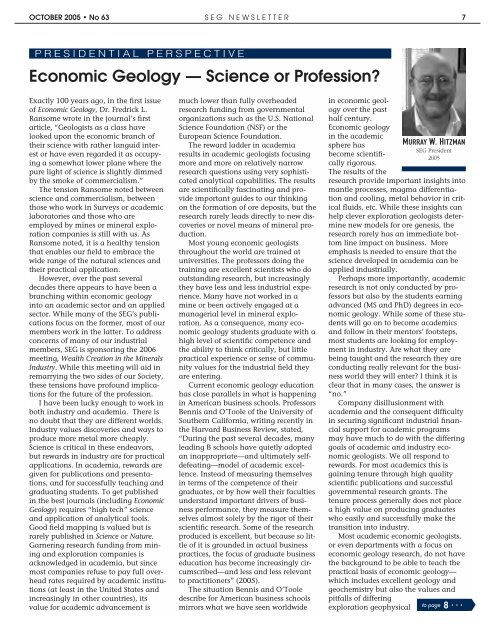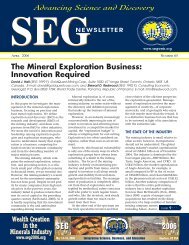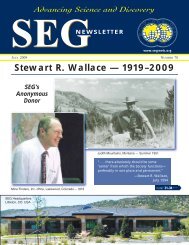SEG 45 Final_qx4 - Society of Economic Geologists
SEG 45 Final_qx4 - Society of Economic Geologists
SEG 45 Final_qx4 - Society of Economic Geologists
You also want an ePaper? Increase the reach of your titles
YUMPU automatically turns print PDFs into web optimized ePapers that Google loves.
OCTOBER 2005 • No 63 <strong>SEG</strong> NEWSLETTER 7<br />
PRESIDENTIAL PERSPECTIVE<br />
<strong>Economic</strong> Geology — Science or Pr<strong>of</strong>ession?<br />
Exactly 100 years ago, in the first issue<br />
<strong>of</strong> <strong>Economic</strong> Geology, Dr. Fredrick L.<br />
Ransome wrote in the journal’s first<br />
article, “<strong>Geologists</strong> as a class have<br />
looked upon the economic branch <strong>of</strong><br />
their science with rather languid interest<br />
or have even regarded it as occupying<br />
a somewhat lower plane where the<br />
pure light <strong>of</strong> science is slightly dimmed<br />
by the smoke <strong>of</strong> commercialism.”<br />
The tension Ransome noted between<br />
science and commercialism, between<br />
those who work in Surveys or academic<br />
laboratories and those who are<br />
employed by mines or mineral exploration<br />
companies is still with us. As<br />
Ransome noted, it is a healthy tension<br />
that enables our field to embrace the<br />
wide range <strong>of</strong> the natural sciences and<br />
their practical application.<br />
However, over the past several<br />
decades there appears to have been a<br />
branching within economic geology<br />
into an academic sector and an applied<br />
sector. While many <strong>of</strong> the <strong>SEG</strong>’s publications<br />
focus on the former, most <strong>of</strong> our<br />
members work in the latter. To address<br />
concerns <strong>of</strong> many <strong>of</strong> our industrial<br />
members, <strong>SEG</strong> is sponsoring the 2006<br />
meeting, Wealth Creation in the Minerals<br />
Industry. While this meeting will aid in<br />
remarrying the two sides <strong>of</strong> our <strong>Society</strong>,<br />
these tensions have pr<strong>of</strong>ound implications<br />
for the future <strong>of</strong> the pr<strong>of</strong>ession.<br />
I have been lucky enough to work in<br />
both industry and academia. There is<br />
no doubt that they are different worlds.<br />
Industry values discoveries and ways to<br />
produce more metal more cheaply.<br />
Science is critical in these endeavors,<br />
but rewards in industry are for practical<br />
applications. In academia, rewards are<br />
given for publications and presentations,<br />
and for successfully teaching and<br />
graduating students. To get published<br />
in the best journals (including <strong>Economic</strong><br />
Geology) requires “high tech” science<br />
and application <strong>of</strong> analytical tools.<br />
Good field mapping is valued but is<br />
rarely published in Science or Nature.<br />
Garnering research funding from mining<br />
and exploration companies is<br />
acknowledged in academia, but since<br />
most companies refuse to pay full overhead<br />
rates required by academic institutions<br />
(at least in the United States and<br />
increasingly in other countries), its<br />
value for academic advancement is<br />
much lower than fully overheaded<br />
research funding from governmental<br />
organizations such as the U.S. National<br />
Science Foundation (NSF) or the<br />
European Science Foundation.<br />
The reward ladder in academia<br />
results in academic geologists focusing<br />
more and more on relatively narrow<br />
research questions using very sophisticated<br />
analytical capabilities. The results<br />
are scientifically fascinating and provide<br />
important guides to our thinking<br />
on the formation <strong>of</strong> ore deposits, but the<br />
research rarely leads directly to new discoveries<br />
or novel means <strong>of</strong> mineral production.<br />
Most young economic geologists<br />
throughout the world are trained at<br />
universities. The pr<strong>of</strong>essors doing the<br />
training are excellent scientists who do<br />
outstanding research, but increasingly<br />
they have less and less industrial experience.<br />
Many have not worked in a<br />
mine or been actively engaged at a<br />
managerial level in mineral exploration.<br />
As a consequence, many economic<br />
geology students graduate with a<br />
high level <strong>of</strong> scientific competence and<br />
the ability to think critically, but little<br />
practical experience or sense <strong>of</strong> community<br />
values for the industrial field they<br />
are entering.<br />
Current economic geology education<br />
has close parallels in what is happening<br />
in American business schools. Pr<strong>of</strong>essors<br />
Bennis and O’Toole <strong>of</strong> the University <strong>of</strong><br />
Southern California, writing recently in<br />
the Harvard Business Review, stated,<br />
“During the past several decades, many<br />
leading B schools have quietly adopted<br />
an inappropriate—and ultimately selfdefeating—model<br />
<strong>of</strong> academic excellence.<br />
Instead <strong>of</strong> measuring themselves<br />
in terms <strong>of</strong> the competence <strong>of</strong> their<br />
graduates, or by how well their faculties<br />
understand important drivers <strong>of</strong> business<br />
performance, they measure themselves<br />
almost solely by the rigor <strong>of</strong> their<br />
scientific research. Some <strong>of</strong> the research<br />
produced is excellent, but because so little<br />
<strong>of</strong> it is grounded in actual business<br />
practices, the focus <strong>of</strong> graduate business<br />
education has become increasingly circumscribed—and<br />
less and less relevant<br />
to practitioners” (2005).<br />
The situation Bennis and O’Toole<br />
describe for American business schools<br />
mirrors what we have seen worldwide<br />
in economic geology<br />
over the past<br />
half century.<br />
<strong>Economic</strong> geology<br />
in the academic<br />
sphere has<br />
become scientifically<br />
rigorous.<br />
The results <strong>of</strong> the<br />
research provide important insights into<br />
mantle processes, magma differentiation<br />
and cooling, metal behavior in critical<br />
fluids, etc. While these insights can<br />
help clever exploration geologists determine<br />
new models for ore genesis, the<br />
research rarely has an immediate bottom<br />
line impact on business. More<br />
emphasis is needed to ensure that the<br />
science developed in academia can be<br />
applied industrially.<br />
Perhaps more importantly, academic<br />
research is not only conducted by pr<strong>of</strong>essors<br />
but also by the students earning<br />
advanced (MS and PhD) degrees in economic<br />
geology. While some <strong>of</strong> these students<br />
will go on to become academics<br />
and follow in their mentors’ footsteps,<br />
most students are looking for employment<br />
in industry. Are what they are<br />
being taught and the research they are<br />
conducting really relevant for the business<br />
world they will enter? I think it is<br />
clear that in many cases, the answer is<br />
“no.”<br />
Company disillusionment with<br />
academia and the consequent difficulty<br />
in securing significant industrial financial<br />
support for academic programs<br />
may have much to do with the differing<br />
goals <strong>of</strong> academic and industry economic<br />
geologists. We all respond to<br />
rewards. For most academics this is<br />
gaining tenure through high quality<br />
scientific publications and successful<br />
governmental research grants. The<br />
tenure process generally does not place<br />
a high value on producing graduates<br />
who easily and successfully make the<br />
transition into industry.<br />
Most academic economic geologists,<br />
or even departments with a focus on<br />
economic geology research, do not have<br />
the background to be able to teach the<br />
practical basis <strong>of</strong> economic geology—<br />
which includes excellent geology and<br />
geochemistry but also the values and<br />
pitfalls <strong>of</strong> differing<br />
exploration geophysical<br />
MURRAY W. HITZMAN<br />
<strong>SEG</strong> President<br />
2005<br />
to page 8 ...






